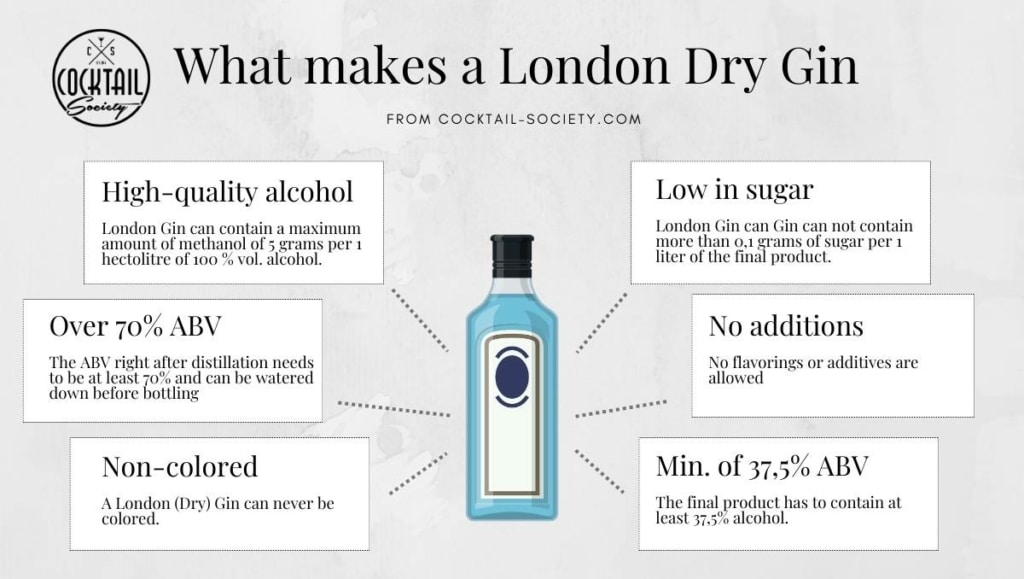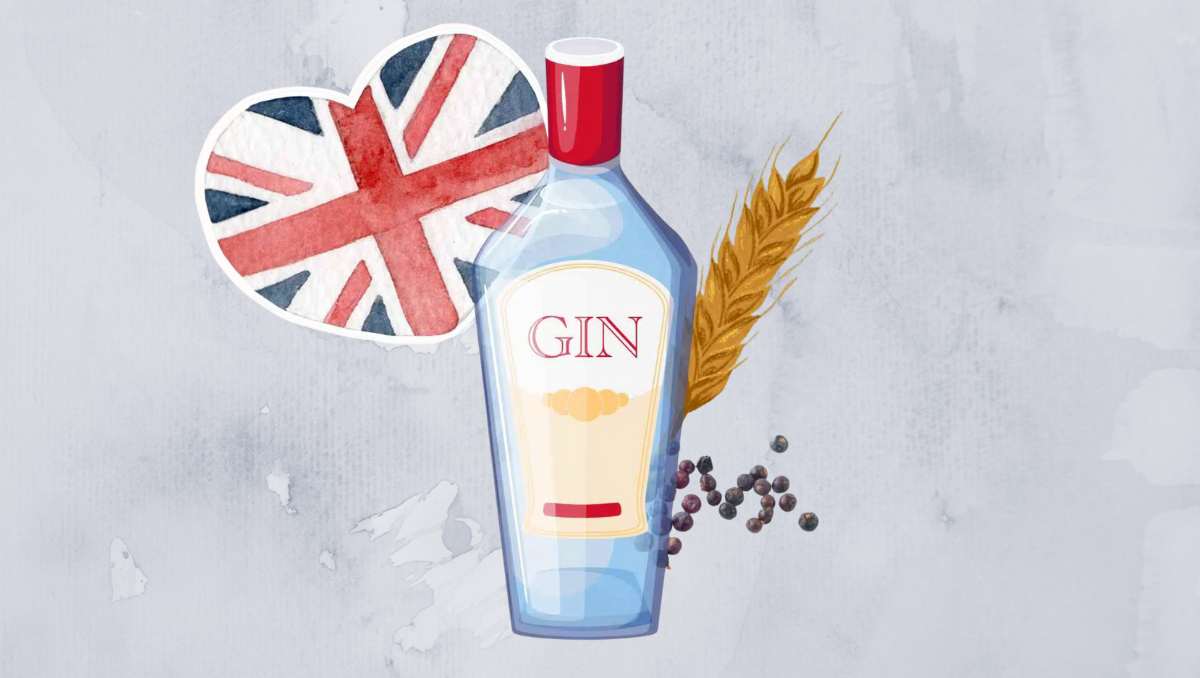When looking at labels of gin bottles on the shelves of liquor stores, you often find the addendum London Dry Gin. Some popular examples are Sipsmith, Tanqueray, Gordons, and Beefeater London Dry Gin.
So what exactly should this tell you? First of all, it has nothing to do with London but indicates that the respective gin meets a set of specific criteria.
But why is it called London Dry, and how is it different from other gins? We shed light on this and much more.
A closer look at London Dry Gin
London Dry Gin is a distilled spirit infused with botanicals, mainly juniper. It has to meet all criteria of a London Gin, which includes being unsweetened. Thus, the addition of dry.
The European (EU) Law distinguishes three types: gin, distilled gin, and London Gin. The term Dry may be used if no additional sweeteners go into a product and the amount of sugar in the final product is less than 0,1 grams per 1 liter.
The set of botanicals in London Gin depends on the specific brand and can vary. Besides juniper, other common botanicals in Gin are lemon peel, orange peel, orris root, angelica, licorice roots, cassia, and cinnamon bark.
Requirements to be categorized as London Gin
According to the updated definition of the European Law from 2019, a London Gin is a distilled Gin that complies with the following:
- Only use high-quality alcohol: In numbers, this means that the ethyl alcohol to produce London Gin can contain a maximum amount of methanol of 5 grams per 1 hectolitre of 100 % vol. alcohol. Its aroma is achieved exclusively by distilling ethyl alcohol with natural botanicals. [Juniper must be the dominant flavoring]
- Over 70% ABV after distillation: This is not bottling strength, but the ABV right after distillation. Typically, producers mix the distillate with water to achieve the final ABV.
- Additional ethyl alcohol is allowed: Mixing the distillate with further ethyl alcohol is possible, but only if that meets all other criteria.
- No color: A true London Gin can never be colored. So you don't see any color-changing London or London Dry Gins.
- Low in sugar: The Gin can not contain more than 0,1 grams of sugar per 1 liter of the final product.
- No additional ingredients: Besides ethyl alcohol, natural botanicals, water, and sweetening products, no flavorings or additives are allowed.
- Minimum of 37,5% ABV: The final product has to contain at least 37,5% alcohol.
- "Dry" may be used on the label: Gins that meet all criteria to be a London Gin may use the addition Dry.

The difference between London Dry and other Gin
In a nutshell, this means that London Gin is much more strictly regulated, thus, usually has the traditional juniper-heavy flavor profile. It is neither colored nor sweetened, and subsequent addition of flavorings is also not allowed (neither artificial nor natural), unlike for Gin and Distilled Gin, where such additives are legally permitted.
Besides Gin, Distilled Gin, and London Gin, there are more types of gin that are not legally protected or specified. For instance, New Western Dry, Plymouth, Bathtub, or Old Tom Gin. These types either comply with the definition of Gin or Distilled Gin.
So, for getting the complete picture, let's have a look at how these two types are defined:
Gin:
- Gin is a spirit produced by flavoring ethyl alcohol of agricultural origin with juniper berries.
- The minimum alcohol content of gin is 37.5% vol.
- The term dry may be used if the sugar content is below 0.1 g per liter.
Additional requirements for Distilled Gin:
- Produced exclusively or partly by distillation of ethyl alcohol of agricultural origin with an initial alcoholic strength by volume of no less than 96% with the addition of juniper berries and other natural botanicals.
- Gin produced exclusively with the addition of essences or flavorings to ethyl alcohol of agricultural origin is not considered distilled gin.
How does London Dry Gin taste?
London Dry Gin is more traditional when it comes to taste and it also contains less sugar than most other gin types. It is known to be juniper-forward, herbaceous, dry, crisp, and not overly fruity.
Not every gin in the category tastes the same, but most share a similar flavor profile, somewhat reminiscent of pine.
Origin and why it is called London Dry
Even though the city of London is not directly connected to the production, it plays a crucial role in the history of gin, hence, it is the namesake of London Dry Gin.
Gin was first distilled in London in 1638 when King Charles founded the Worshipful Company of Distillers. At the time, its members had a monopoly on gin production. -Hence, the name.
However, the tradition of London Gin is a legacy of a Dutchman - King William III, also known as William of Orange. When he ascended to the throne of England and Ireland on January 22, 1689, he introduced a traditional Dutch alcoholic beverage called Genever - the forerunner of gin.
How to drink London Gin
London Gins are great in classic gin cocktail recipes like a Negroni, Dry Martini, and Gin Sour. Those who like strong alcohol can also enjoy the spirit pure or on the rocks.
Yet, the number one most popular way to imbibe a London Dry Gin is in a Gin and Tonic. Mixed with the right tonic water, this simple and classic drink showcases the wonderful botanical flavors in a gin.
Popular London Dry Gin brands
Most of the old and traditional gin brands produce London Dry Gin. The most popular ones and bestsellers are:
- Gordon's
- Beefeater
- Tanqueray
- Hayman's
- Bombay Sapphire
- Seagram's

